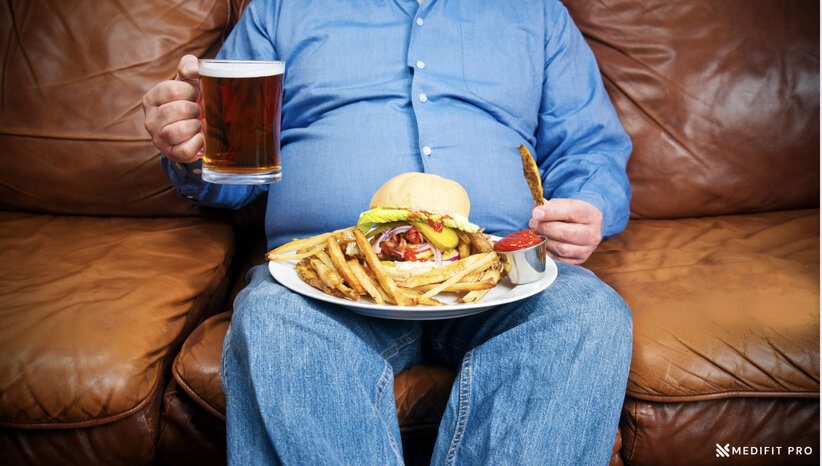Losing weight can be a frustrating and challenging process. Many people struggle to shed those extra pounds despite their best efforts, leaving them feeling discouraged and defeated. Unfortunately, the consequences of obesity are serious and far-reaching, including an increased risk of heart disease, stroke, diabetes, and other health issues.
The problem of weight loss is a complex one, and there are a multitude of factors that can contribute to difficulties in shedding excess pounds. These may include overeating, a sedentary lifestyle, medical conditions, and inconsistent tracking of food and exercise.
In this article, we will explore some of the common reasons why people may not be losing weight, as well as strategies for overcoming these barriers to achieve a healthier and happier life. Whether you have been struggling to lose weight for years or are just starting out on your weight loss journey, this article will provide you with the tools and knowledge you need to succeed. So let’s dive in!
II. Reasons why you might not be losing weight
A. Overeating or poor food choices

One of the most common reasons why people struggle to lose weight is due to overeating or poor food choices. Many processed and fast foods are high in calories and low in nutrients, making it easy to consume more calories than your body needs.
To combat this, it’s important to be mindful of what you’re eating and to make healthier choices whenever possible. Some examples of unhealthy foods that should be limited or avoided include sugary drinks, fried foods, processed snacks, and desserts.
Instead, focus on consuming nutrient-dense foods that are low in calories, such as fruits and vegetables, lean proteins, whole grains, and healthy fats. These foods will provide your body with the nutrients it needs to function properly, while also helping you feel fuller for longer.
In addition to making healthier food choices, it’s also important to reduce your overall calorie intake if you want to lose weight. This can be done by reducing portion sizes, choosing lower calorie options, and avoiding mindless snacking.
B. Lack of physical activity or sedentary lifestyle
Another common reason why people struggle to lose weight is due to a lack of physical activity or a sedentary lifestyle. Exercise is an essential component of weight loss because it helps to burn calories and increase muscle mass, both of which can contribute to a higher metabolic rate.
Regular exercise also has numerous other benefits, including reducing the risk of chronic diseases, improving cardiovascular health, and boosting mood and energy levels.
If you’re not currently exercising, it’s important to start slowly and gradually increase your activity level over time. This can include activities such as walking, jogging, swimming, cycling, or strength training. Aim for at least 150 minutes of moderate-intensity exercise per week, or 75 minutes of vigorous-intensity exercise.

Incorporating physical activity into your daily routine can also be helpful. This can include taking the stairs instead of the elevator, parking farther away from your destination, or doing some stretching or strength exercises during your lunch break.
Remember, any amount of physical activity is better than none, so start where you are and work towards increasing your activity level over time. If you’re having trouble with finding motivation for exercise, read How to Stay Motivated for Exercise
C. Medical conditions or medications
In some cases, medical conditions or medications may be contributing to difficulties in losing weight. For example, hypothyroidism is a condition in which the thyroid gland doesn’t produce enough thyroid hormone, which can slow down the metabolism and make it harder to lose weight.
Other medical conditions that can affect weight loss include polycystic ovary syndrome (PCOS), Cushing’s syndrome, and sleep apnea. These conditions can all affect hormone levels and metabolic rate, making it more difficult to lose weight.
In addition to medical conditions, certain medications may also contribute to weight gain or make it harder to lose weight. Some examples include antidepressants, antipsychotics, and corticosteroids. These medications can affect appetite, metabolism, and energy levels, making it more difficult to maintain a healthy weight.
If you suspect that a medical condition or medication may be affecting your weight loss efforts, it’s important to speak with your healthcare provider. They can help you determine the underlying cause and develop a treatment plan to address the issue.
D. Inconsistent or inaccurate tracking of food and exercise
Another reason why you might not be losing weight is due to inconsistent or inaccurate tracking of your food and exercise. Tracking your calorie intake and physical activity is an important component of weight loss because it helps you to identify areas where you may be consuming too many calories or not getting enough exercise.
Inconsistent tracking can lead to underestimating calorie intake or overestimating the number of calories burned during exercise, which can make it difficult to accurately gauge progress and make necessary adjustments.
To ensure accurate and consistent tracking, it’s important to use a reliable method, such as a food diary or mobile app, to record your food intake and exercise. Be sure to measure and weigh your food to accurately estimate portion sizes, and track all beverages and snacks as well.
When tracking exercise, use a heart rate monitor or fitness tracker to get an accurate estimate of the number of calories burned, and record the type, duration, and intensity of each activity.
Remember, tracking your food and exercise is not meant to be a punishment or a way to restrict yourself. Instead, it’s a tool to help you make informed decisions about your health and reach your weight loss goals.
III. Strategies for overcoming barriers to weight loss
A. Seek support from friends, family, or healthcare professionals
Losing weight can be a challenging journey, and seeking support from others can make a big difference in your success. Consider enlisting the help of friends, family members, or a healthcare professional to provide encouragement, accountability, and guidance.
Friends and family can provide emotional support and may even be willing to join you in making healthier lifestyle changes. A healthcare professional, such as a registered dietitian or personal trainer, can provide expert advice on nutrition and exercise, as well as help you develop a personalized plan for achieving your weight loss goals.
B. Set realistic goals and track progress
Setting realistic goals is key to making sustainable changes and avoiding frustration and disappointment. Rather than aiming for a drastic weight loss in a short period of time, focus on making small, manageable changes that you can maintain over the long-term.
Tracking your progress is also important for staying motivated and on-track. Consider keeping a weight loss journal or using a mobile app to track your food intake, exercise, and weight loss progress.
C. Experiment with different diet and exercise approaches
Different approaches to diet and exercise work for different people, so it’s important to find what works best for you. Experiment with different types of exercise and healthy eating plans to find a sustainable approach that you enjoy and can stick to.
Don’t be afraid to try new things, such as group fitness classes or healthy recipes, to keep things interesting and prevent boredom.
D. Address underlying emotional or psychological issues related to food and weight
Emotional and psychological factors can play a big role in weight loss success. If you struggle with emotional eating, stress, anxiety, or other issues that impact your relationship with food, it’s important to address these underlying issues.
Consider seeking the help of a therapist or counselor who specialises in eating disorders or weight management to address these underlying emotional or psychological factors and develop coping strategies that can support your weight loss efforts. Also read 20 Habits for a Better Mental Health
IV. Conclusion
In conclusion, weight loss can be a challenging and complex journey, but it is an important step towards achieving optimal health and reducing the risk of associated health conditions. In this article, we have discussed some of the common barriers to weight loss, including overeating, sedentary lifestyle, medical conditions or medications, and inconsistent tracking of food and exercise.
To overcome these barriers, we have suggested various strategies, such as seeking support from friends, family, or healthcare professionals, setting realistic goals and tracking progress, experimenting with different diet and exercise approaches, and addressing underlying emotional or psychological issues related to food and weight.
Remember, making sustainable lifestyle changes takes time, effort, and patience. If you are struggling to lose weight, don’t be afraid to seek help from a healthcare professional, therapist, or counselor who can provide personalized guidance and support.
By taking action and implementing the strategies discussed in this article, you can achieve your weight loss goals and improve your overall health and well-being.
Also read 20 Weight Loss Myths Debunked
Reference
Centers for Disease Control and Prevention (CDC) – Healthy Weight: https://www.cdc.gov/healthyweight/index.html

























Recent Comments